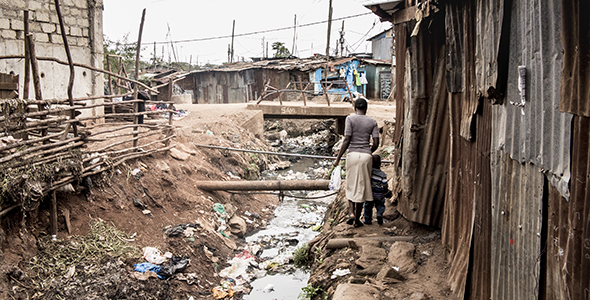By the bioMérieux Connection Editors
Most of the time, we discuss antimicrobial resistance in context of healthcare, especially prescribing practices. However, antibiotic overuse and misuse in patients is not the only driver of rising antimicrobial resistance. Two other major sources of antimicrobial resistance are food production and environmental pollution.
Antimicrobial resistance from pollution is frequently a result of poor sanitation and inadequate wastewater management, as well as run-off or discharge from industrial, farming, and hospital operations. It is well-established that low-income communities and countries bear the most direct consequences of pollution, and this includes pollution that leads to antimicrobial resistance. In large part, this is a result of inadequate infrastructure, regulation, and regulatory enforcement brought about by lack of economic and political resources.
The Importance and Challenge of Continuous Clean Water Access
A highly effective public health measure for preventing infectious disease is providing continuous access to clean water, effective sanitation, and good wastewater management practices and infrastructure. In the United States, public health officials in some municipalities acknowledged this when they mandated that a household’s water could not be shut off due to unpaid water bills while the COVID-19 pandemic remains.
However, in low-income countries, clean water access is often more complicated than overlooking unpaid bills. In many cases, unreliable infrastructure can interrupt access, and some communities lack the necessary infrastructure entirely. Infections spread more readily when people are unable to access clean water and effective sanitation.
Breaking the Cycle of Water Contamination, Infectious Disease, and Antimicrobial Resistance
When people become ill, they naturally seek treatment. Often, treatment comes in the form of antibiotics, and in many low-income countries, people can buy antibiotics over the counter and in variable quantities. However, self-medication can be ineffective, unsafe, or both.
Exposure to antibiotics, particularly unnecessary exposure, contributes to antimicrobial resistance by killing susceptible bacteria while leaving resistant bacteria alive to reproduce. Over time, frequent exposure to antibiotics can lead to resistant bacteria developing in people’s intestinal tracts. A portion of those bacteria are then expelled when a person has a bowel movement, and if there is inadequate sanitation or wastewater management, this can lead to environmental contamination. In turn, such environmental contamination can lead to people acquiring resistant infections—and so the cycle continues.
Providing clean water and sanitation access, along with appropriate wastewater management, may help interrupt this cycle. The authors of a recent paper published in Nature Microbiology specifically address this issue within “urban informal settlements”, which are the world’s poorest, most densely populated communities and which may be unique hot spots for antimicrobial resistance. They propose that, “water and waste infrastructure improvements tailored to these settings should be evaluated for their effectiveness in limiting environmental AMR dissemination, lowering the community-level burden of antimicrobial-resistant infections and preventing antibiotic misuse.” Less contamination means fewer infections, leading to lower antibiotic use within communities, and thus slows the development and spread of antimicrobial resistance.
Conditions in Low-Income Countries and Communities Impact Everyone
Low-income countries already experience the adverse effects of infectious diseases that are resistant to treatment at higher rates than high-income countries. And in general, the poorest communities tend to be the most vulnerable and experience the highest rates of infectious disease. Many of those communities are both densely populated and are experiencing the largest population growth rates.
As the COVID-19 pandemic has demonstrated, infectious diseases do not respect international borders, nor does a country’s wealth impart infection immunity. Conditions in low-income countries and communities ultimately impact everyone, particularly in context of increasing global travel and trade. To fully address the risks that antimicrobial resistance poses to human health, public health measures—including clean water access, sanitation, and wastewater management—should be evaluated, implemented, and enforced regardless of a community’s or country’s economic and political resources.
Opinions expressed in this article are not necessarily those of bioMérieux, Inc.



